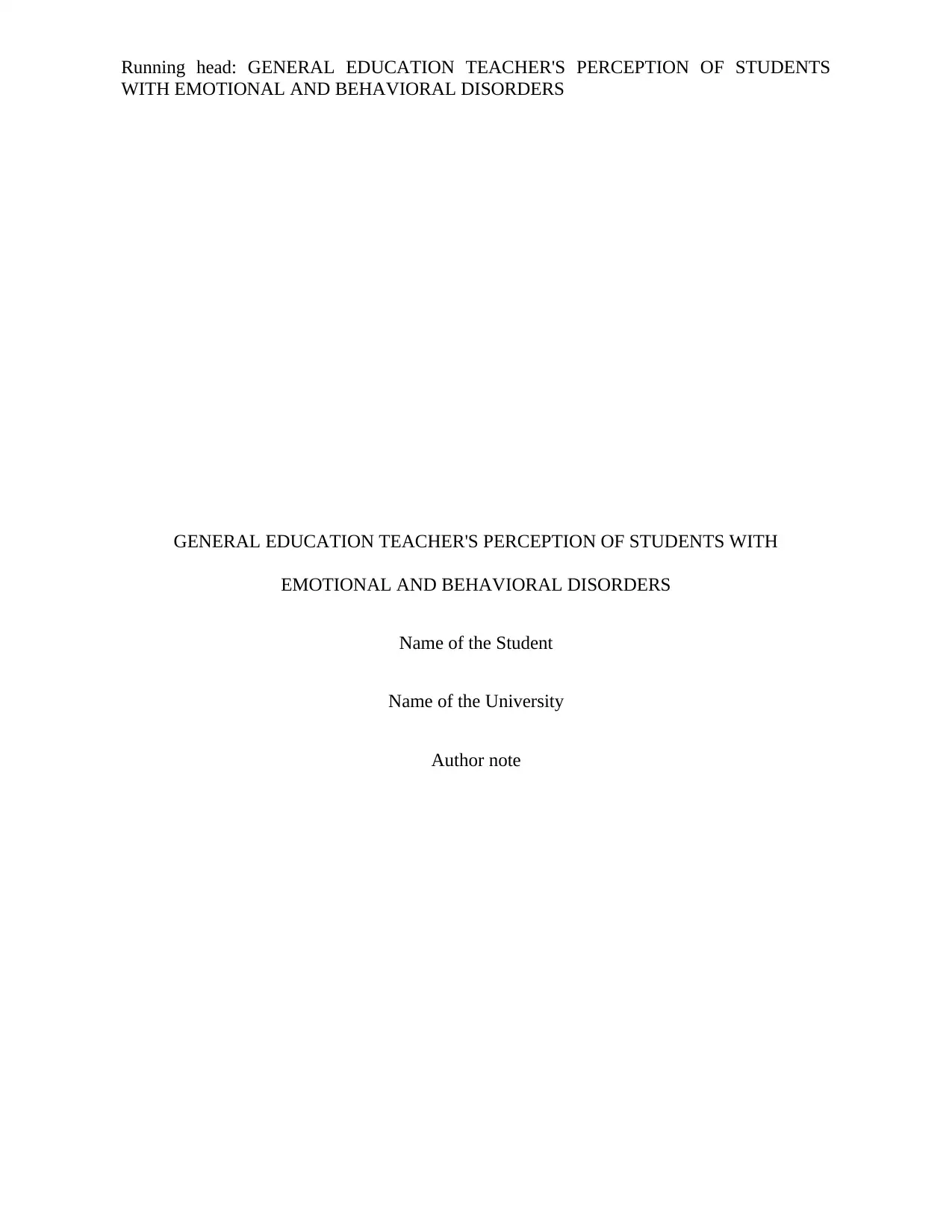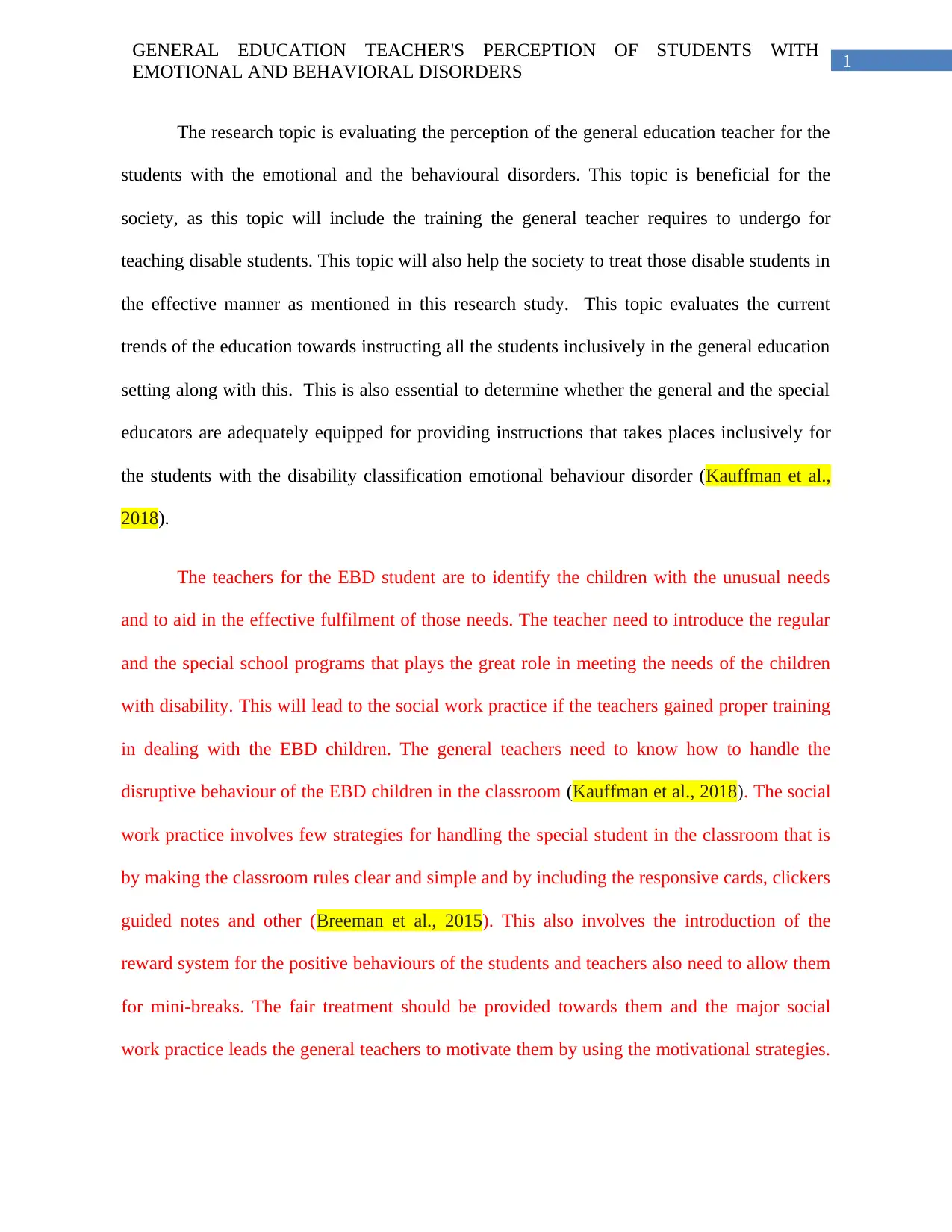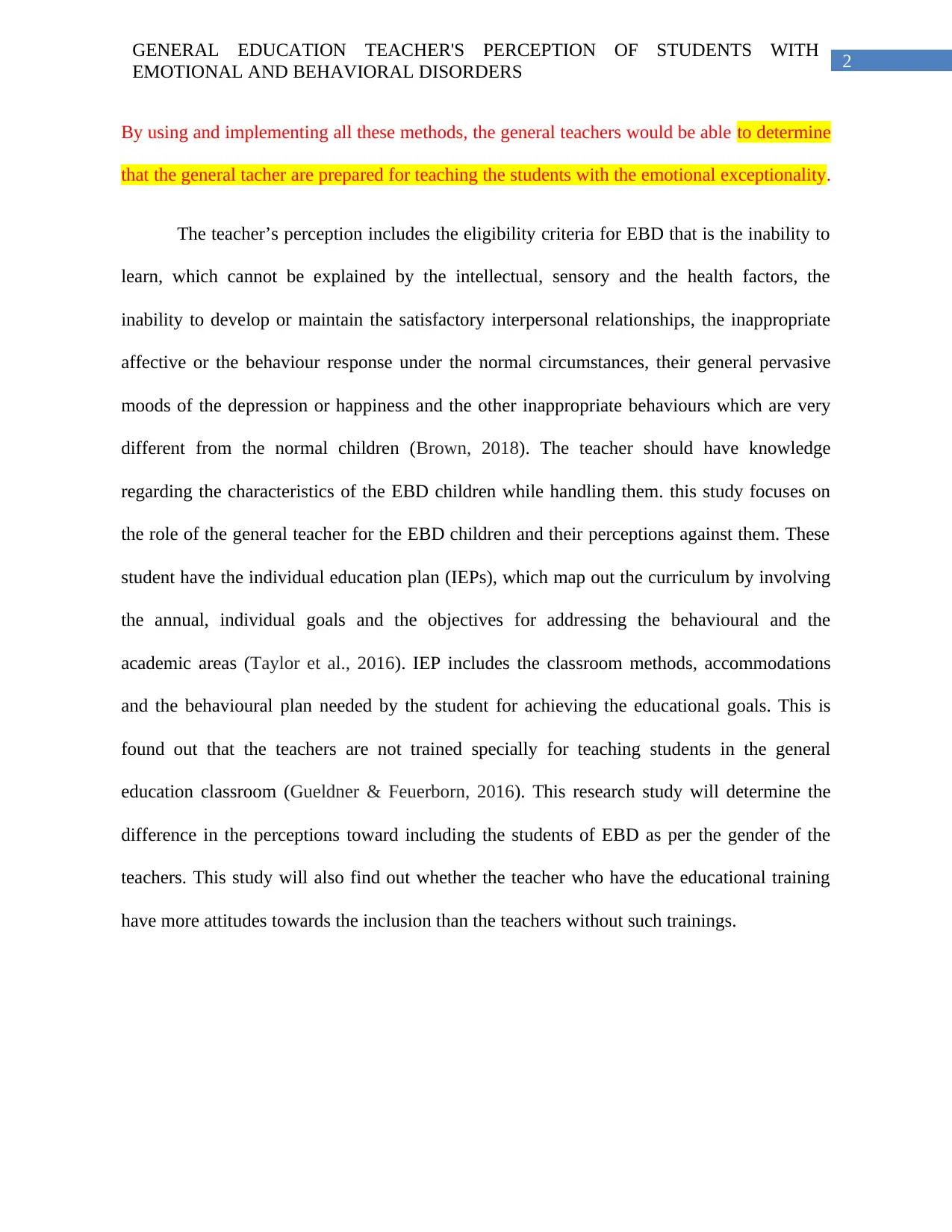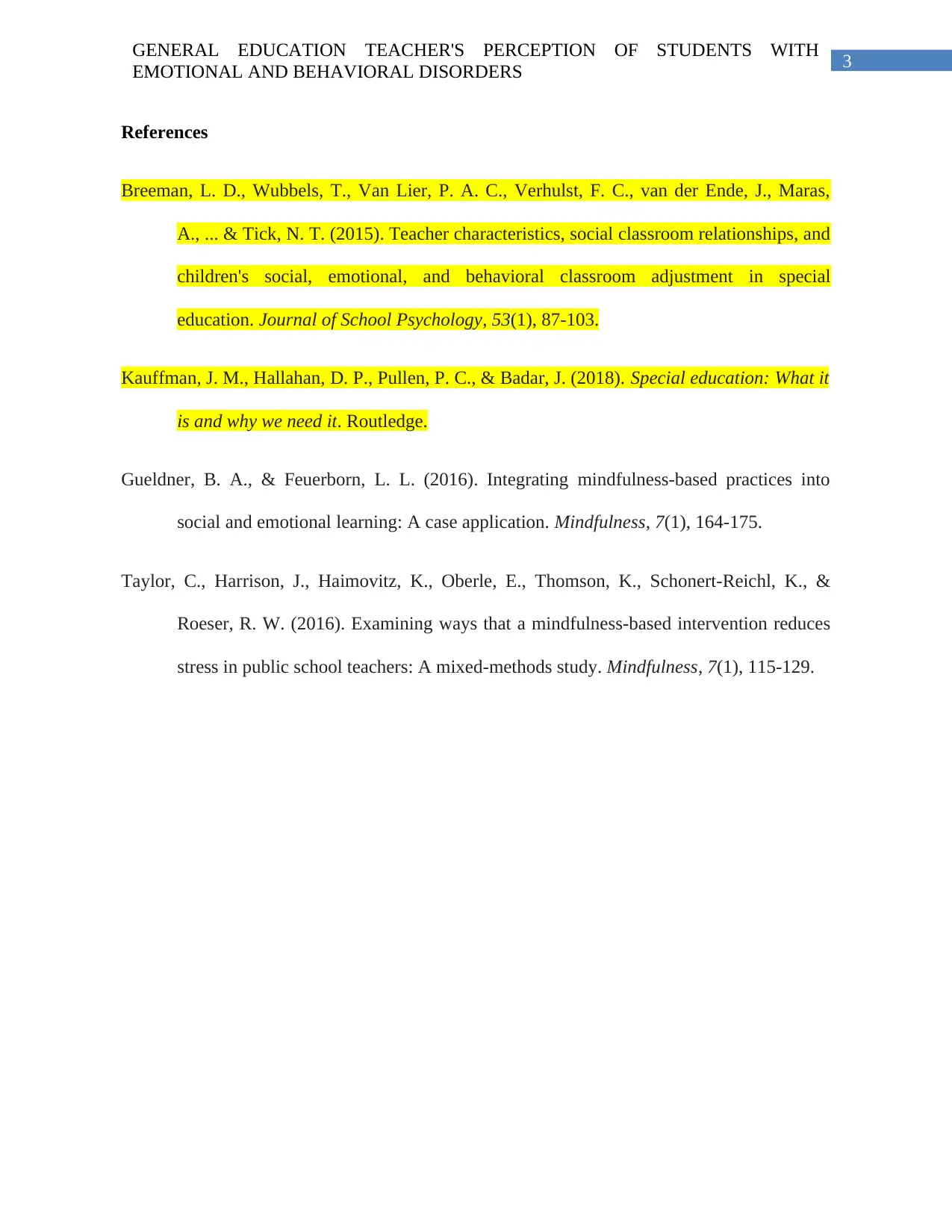Perception of General Teachers Towards Students with EBD: A Study
VerifiedAdded on 2023/04/20
|4
|914
|392
Essay
AI Summary
This essay explores the perceptions of general education teachers towards students with Emotional and Behavioral Disorders (EBD). It highlights the importance of training for general teachers in handling students with disabilities and addressing their unique needs effectively. The study examines how teachers perceive the eligibility criteria for EBD, their ability to manage disruptive behaviors, and the role of Individualized Education Programs (IEPs) in supporting these students. Furthermore, the research investigates whether teachers with specific educational training exhibit more positive attitudes towards inclusion compared to those without such training, and if gender influences their perceptions. The essay emphasizes the necessity for teachers to be equipped with the skills and knowledge to create inclusive and supportive learning environments for students with EBD.

Running head: GENERAL EDUCATION TEACHER'S PERCEPTION OF STUDENTS
WITH EMOTIONAL AND BEHAVIORAL DISORDERS
GENERAL EDUCATION TEACHER'S PERCEPTION OF STUDENTS WITH
EMOTIONAL AND BEHAVIORAL DISORDERS
Name of the Student
Name of the University
Author note
WITH EMOTIONAL AND BEHAVIORAL DISORDERS
GENERAL EDUCATION TEACHER'S PERCEPTION OF STUDENTS WITH
EMOTIONAL AND BEHAVIORAL DISORDERS
Name of the Student
Name of the University
Author note
Paraphrase This Document
Need a fresh take? Get an instant paraphrase of this document with our AI Paraphraser

1
GENERAL EDUCATION TEACHER'S PERCEPTION OF STUDENTS WITH
EMOTIONAL AND BEHAVIORAL DISORDERS
The research topic is evaluating the perception of the general education teacher for the
students with the emotional and the behavioural disorders. This topic is beneficial for the
society, as this topic will include the training the general teacher requires to undergo for
teaching disable students. This topic will also help the society to treat those disable students in
the effective manner as mentioned in this research study. This topic evaluates the current
trends of the education towards instructing all the students inclusively in the general education
setting along with this. This is also essential to determine whether the general and the special
educators are adequately equipped for providing instructions that takes places inclusively for
the students with the disability classification emotional behaviour disorder (Kauffman et al.,
2018).
The teachers for the EBD student are to identify the children with the unusual needs
and to aid in the effective fulfilment of those needs. The teacher need to introduce the regular
and the special school programs that plays the great role in meeting the needs of the children
with disability. This will lead to the social work practice if the teachers gained proper training
in dealing with the EBD children. The general teachers need to know how to handle the
disruptive behaviour of the EBD children in the classroom (Kauffman et al., 2018). The social
work practice involves few strategies for handling the special student in the classroom that is
by making the classroom rules clear and simple and by including the responsive cards, clickers
guided notes and other (Breeman et al., 2015). This also involves the introduction of the
reward system for the positive behaviours of the students and teachers also need to allow them
for mini-breaks. The fair treatment should be provided towards them and the major social
work practice leads the general teachers to motivate them by using the motivational strategies.
GENERAL EDUCATION TEACHER'S PERCEPTION OF STUDENTS WITH
EMOTIONAL AND BEHAVIORAL DISORDERS
The research topic is evaluating the perception of the general education teacher for the
students with the emotional and the behavioural disorders. This topic is beneficial for the
society, as this topic will include the training the general teacher requires to undergo for
teaching disable students. This topic will also help the society to treat those disable students in
the effective manner as mentioned in this research study. This topic evaluates the current
trends of the education towards instructing all the students inclusively in the general education
setting along with this. This is also essential to determine whether the general and the special
educators are adequately equipped for providing instructions that takes places inclusively for
the students with the disability classification emotional behaviour disorder (Kauffman et al.,
2018).
The teachers for the EBD student are to identify the children with the unusual needs
and to aid in the effective fulfilment of those needs. The teacher need to introduce the regular
and the special school programs that plays the great role in meeting the needs of the children
with disability. This will lead to the social work practice if the teachers gained proper training
in dealing with the EBD children. The general teachers need to know how to handle the
disruptive behaviour of the EBD children in the classroom (Kauffman et al., 2018). The social
work practice involves few strategies for handling the special student in the classroom that is
by making the classroom rules clear and simple and by including the responsive cards, clickers
guided notes and other (Breeman et al., 2015). This also involves the introduction of the
reward system for the positive behaviours of the students and teachers also need to allow them
for mini-breaks. The fair treatment should be provided towards them and the major social
work practice leads the general teachers to motivate them by using the motivational strategies.

2
GENERAL EDUCATION TEACHER'S PERCEPTION OF STUDENTS WITH
EMOTIONAL AND BEHAVIORAL DISORDERS
By using and implementing all these methods, the general teachers would be able to determine
that the general tacher are prepared for teaching the students with the emotional exceptionality.
The teacher’s perception includes the eligibility criteria for EBD that is the inability to
learn, which cannot be explained by the intellectual, sensory and the health factors, the
inability to develop or maintain the satisfactory interpersonal relationships, the inappropriate
affective or the behaviour response under the normal circumstances, their general pervasive
moods of the depression or happiness and the other inappropriate behaviours which are very
different from the normal children (Brown, 2018). The teacher should have knowledge
regarding the characteristics of the EBD children while handling them. this study focuses on
the role of the general teacher for the EBD children and their perceptions against them. These
student have the individual education plan (IEPs), which map out the curriculum by involving
the annual, individual goals and the objectives for addressing the behavioural and the
academic areas (Taylor et al., 2016). IEP includes the classroom methods, accommodations
and the behavioural plan needed by the student for achieving the educational goals. This is
found out that the teachers are not trained specially for teaching students in the general
education classroom (Gueldner & Feuerborn, 2016). This research study will determine the
difference in the perceptions toward including the students of EBD as per the gender of the
teachers. This study will also find out whether the teacher who have the educational training
have more attitudes towards the inclusion than the teachers without such trainings.
GENERAL EDUCATION TEACHER'S PERCEPTION OF STUDENTS WITH
EMOTIONAL AND BEHAVIORAL DISORDERS
By using and implementing all these methods, the general teachers would be able to determine
that the general tacher are prepared for teaching the students with the emotional exceptionality.
The teacher’s perception includes the eligibility criteria for EBD that is the inability to
learn, which cannot be explained by the intellectual, sensory and the health factors, the
inability to develop or maintain the satisfactory interpersonal relationships, the inappropriate
affective or the behaviour response under the normal circumstances, their general pervasive
moods of the depression or happiness and the other inappropriate behaviours which are very
different from the normal children (Brown, 2018). The teacher should have knowledge
regarding the characteristics of the EBD children while handling them. this study focuses on
the role of the general teacher for the EBD children and their perceptions against them. These
student have the individual education plan (IEPs), which map out the curriculum by involving
the annual, individual goals and the objectives for addressing the behavioural and the
academic areas (Taylor et al., 2016). IEP includes the classroom methods, accommodations
and the behavioural plan needed by the student for achieving the educational goals. This is
found out that the teachers are not trained specially for teaching students in the general
education classroom (Gueldner & Feuerborn, 2016). This research study will determine the
difference in the perceptions toward including the students of EBD as per the gender of the
teachers. This study will also find out whether the teacher who have the educational training
have more attitudes towards the inclusion than the teachers without such trainings.
⊘ This is a preview!⊘
Do you want full access?
Subscribe today to unlock all pages.

Trusted by 1+ million students worldwide

3
GENERAL EDUCATION TEACHER'S PERCEPTION OF STUDENTS WITH
EMOTIONAL AND BEHAVIORAL DISORDERS
References
Breeman, L. D., Wubbels, T., Van Lier, P. A. C., Verhulst, F. C., van der Ende, J., Maras,
A., ... & Tick, N. T. (2015). Teacher characteristics, social classroom relationships, and
children's social, emotional, and behavioral classroom adjustment in special
education. Journal of School Psychology, 53(1), 87-103.
Kauffman, J. M., Hallahan, D. P., Pullen, P. C., & Badar, J. (2018). Special education: What it
is and why we need it. Routledge.
Gueldner, B. A., & Feuerborn, L. L. (2016). Integrating mindfulness-based practices into
social and emotional learning: A case application. Mindfulness, 7(1), 164-175.
Taylor, C., Harrison, J., Haimovitz, K., Oberle, E., Thomson, K., Schonert-Reichl, K., &
Roeser, R. W. (2016). Examining ways that a mindfulness-based intervention reduces
stress in public school teachers: A mixed-methods study. Mindfulness, 7(1), 115-129.
GENERAL EDUCATION TEACHER'S PERCEPTION OF STUDENTS WITH
EMOTIONAL AND BEHAVIORAL DISORDERS
References
Breeman, L. D., Wubbels, T., Van Lier, P. A. C., Verhulst, F. C., van der Ende, J., Maras,
A., ... & Tick, N. T. (2015). Teacher characteristics, social classroom relationships, and
children's social, emotional, and behavioral classroom adjustment in special
education. Journal of School Psychology, 53(1), 87-103.
Kauffman, J. M., Hallahan, D. P., Pullen, P. C., & Badar, J. (2018). Special education: What it
is and why we need it. Routledge.
Gueldner, B. A., & Feuerborn, L. L. (2016). Integrating mindfulness-based practices into
social and emotional learning: A case application. Mindfulness, 7(1), 164-175.
Taylor, C., Harrison, J., Haimovitz, K., Oberle, E., Thomson, K., Schonert-Reichl, K., &
Roeser, R. W. (2016). Examining ways that a mindfulness-based intervention reduces
stress in public school teachers: A mixed-methods study. Mindfulness, 7(1), 115-129.
1 out of 4
Related Documents
Your All-in-One AI-Powered Toolkit for Academic Success.
+13062052269
info@desklib.com
Available 24*7 on WhatsApp / Email
![[object Object]](/_next/static/media/star-bottom.7253800d.svg)
Unlock your academic potential
Copyright © 2020–2026 A2Z Services. All Rights Reserved. Developed and managed by ZUCOL.





